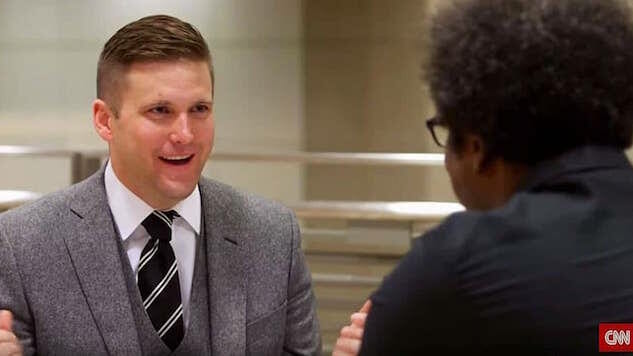W. Kamau Bell Should Have Punched Richard Spencer in the Face
Photo via CNN
It is extraordinary that six months after the election there are still people who think we can defeat white supremacy simply by hearing it out. Practically every day some other centrist mouthpiece descends from some other rarified stratum to share the good word that if we talk to the racists then the racists will lose, as if the racists had not already won, as if the racists were not already moving swiftly to consolidate the power they seized while we were in the corner, politely explaining why they really ought not to have it. On Sunday night that mouthpiece was comedian W. Kamau Bell, though I am sure that tomorrow it will be someone else, and on and on until Trump wins reelection.
Bell, whose CNN documentary series United Shades of America “explores the far corners of our country and its various groups and subcultures,” devoted his second season premiere to the subject of immigration. Through a series of interviews with immigrants and refugees he ultimately comes to the conclusion that they contribute to the economy, and also, literally as an afterthought, that they are humans whose demonization is immoral. The whole 60-minute episode has roughly the tone of a high schooler’s class project—“An immigrant is when you move out of your apartment at noon, and a refugee is when you move at two in the morning”—and seems mostly to serve as a flimsy pretext for its grand finale, Bell’s interview with noted suit-wearer and Nazi Richard Spencer, an interview that addresses such important questions as “Where the ladies at?” and “What do you love about white privilege?” (Spencer likes the suits and how white people look good.) Although CNN promoted the stunt as some sort of tête-à-tête, it’s a largely substance-free dialogue in which Bell laughs uproariously at Spencer’s jokes and offers little in the way of a counterpoint beyond that immigrants make good food. The whole thing is an obvious ratings grab centered around the image of a black comic facing off against a white supremacist. Far be it from me to begrudge a network its ratings, but I do wonder: Why didn’t Bell just punch Richard Spencer in the face?
How would you react? Black comedian @wkamaubell goes face-to-face w/ white nationalist Richard Spencer on #UnitedShades tomorrow at 10p. pic.twitter.com/xdoXYSOhax
— CNN (@CNN) April 29, 2017
Though I may not be a TV writer or producer, I do watch TV both professionally and as a hobby. I’ve seen all the great TV events of our time, from “We have to go back, Kate” to Hairspray Live! If you asked me what’s the one thing missing from contemporary television, I would say this: fascists getting punched. Despite the genre’s wild success online, major networks have yet to embrace what seems like obvious untapped potential. Consider that the first presidential debate was the second-most-watched broadcast of 2016, after the Super Bowl, with 84 million viewers. Now imagine if, instead of debating Trump, Hillary had just walloped him in his dumb ugly fascist old face. Baby, that’s how you get Super Bowl numbers without dropping Super Bowl dough.
I will grant that you cannot make a 60-minute TV episode out of one guy punching one Nazi. But I think Bell easily could have kept his interview segments with some minor tweaks. For instance, instead of asking immigrant entrepreneurs what they’ve built since coming to America, as though one’s worth is measured in economic output, he could ask if they have any ideas for apps that streamline the process of identifying and punching Nazis. Instead of asking the mayor of America’s most diverse city to extol the benefits of diversity, as if that’s a case that legitimately needs to be made to cable audiences, he could perhaps suggest some sort of local holiday where everybody takes off work to identify and punch Nazis. And instead of giving Richard Spencer a platform to spread hate speech, Bell could have just clocked him right in the jaw.
-

-

-

-

-

-

-

-

-

-

-

-

-

-

-

-

-

-

-

-

-

-

-

-

-

-

-

-

-

-

-

-

-

-

-

-

-

-

-

-








































